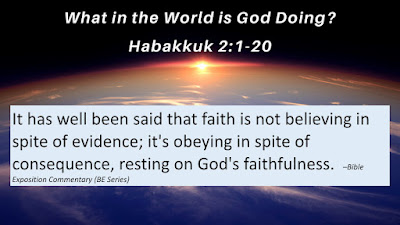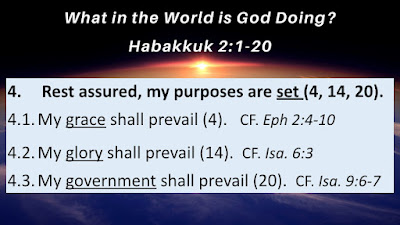I added the picture above to the message I shared with you below.
[source: Biblegateway.]
1 A prayer of Habakkuk the prophet. On shigionoth.
2 Lord, I have heard of your fame;
I stand in awe of your deeds, Lord.
Repeat them in our day,
in our time make them known;
in wrath remember mercy.
3 God came from Teman,
the Holy One from Mount Paran.
His glory covered the heavens
and his praise filled the earth.
4 His splendor was like the sunrise;
rays flashed from his hand,
where his power was hidden.
5 Plague went before him;
pestilence followed his steps.
6 He stood, and shook the earth;
he looked, and made the nations tremble.
The ancient mountains crumbled
and the age-old hills collapsed—
but he marches on forever.
7 I saw the tents of Cushan in distress,
the dwellings of Midian in anguish.
8 Were you angry with the rivers, Lord?
Was your wrath against the streams?
Did you rage against the sea
when you rode your horses
and your chariots to victory?
9 You uncovered your bow,
you called for many arrows.
You split the earth with rivers;
10 the mountains saw you and writhed.
Torrents of water swept by;
the deep roared
and lifted its waves on high.
11 Sun and moon stood still in the heavens
at the glint of your flying arrows,
at the lightning of your flashing spear.
12 In wrath you strode through the earth
and in anger you threshed the nations.
13 You came out to deliver your people,
to save your anointed one.
You crushed the leader of the land of wickedness,
you stripped him from head to foot.
14 With his own spear you pierced his head
when his warriors stormed out to scatter us,
gloating as though about to devour
the wretched who were in hiding.
15 You trampled the sea with your horses,
churning the great waters.
16 I heard and my heart pounded,
my lips quivered at the sound;
decay crept into my bones,
and my legs trembled.
Yet I will wait patiently for the day of calamity
to come on the nation invading us.
17 Though the fig tree does not bud
and there are no grapes on the vines,
though the olive crop fails
and the fields produce no food,
though there are no sheep in the pen
and no cattle in the stalls,
18 yet I will rejoice in the Lord,
I will be joyful in God my Savior.
19 The Sovereign Lord is my strength;
he makes my feet like the feet of a deer,
he enables me to tread on the heights.
I added the picture above to the message I shared with you below.
God Racing on the Crest of the Waves
[source: Biblegateway.com]
1-2 A prayer of the prophet Habakkuk, with orchestra:
God, I’ve heard what our ancestors say about you,
and I’m stopped in my tracks, down on my knees.
Do among us what you did among them.
Work among us as you worked among them.
And as you bring judgment, as you surely must,
remember mercy.
* * *
3-7 God’s on his way again,
retracing the old salvation route,
Coming up from the south through Teman,
the Holy One from Mount Paran.
Skies are blazing with his splendor,
his praises sounding through the earth,
His cloud-brightness like dawn, exploding, spreading,
forked-lightning shooting from his hand—
what power hidden in that fist!
Plague marches before him,
pestilence at his heels!
He stops. He shakes Earth.
He looks around. Nations tremble.
The age-old mountains fall to pieces;
ancient hills collapse like a spent balloon.
The paths God takes are older
than the oldest mountains and hills.
I saw everyone worried, in a panic:
Old wilderness adversaries,
Cushan and Midian, were terrified,
hoping he wouldn’t notice them.
* * *
8-16 God, is it River you’re mad at?
Angry at old River?
Were you raging at Sea when you rode
horse and chariot through to salvation?
You unfurled your bow
and let loose a volley of arrows.
You split Earth with rivers.
Mountains saw what was coming.
They twisted in pain.
Flood Waters poured in.
Ocean roared and reared huge waves.
Sun and Moon stopped in their tracks.
Your flashing arrows stopped them,
your lightning-strike spears impaled them.
Angry, you stomped through Earth.
Furious, you crushed the godless nations.
You were out to save your people,
to save your specially chosen people.
You beat the stuffing
out of King Wicked,
Stripped him naked
from head to toe,
Set his severed head on his own spear
and blew away his army.
Scattered they were to the four winds—
and ended up food for the sharks!
You galloped through the Sea on your horses,
racing on the crest of the waves.
When I heard it, my stomach did flips.
I stammered and stuttered.
My bones turned to water.
I staggered and stumbled.
I sit back and wait for Doomsday
to descend on our attackers.
* * *
17-19 Though the cherry trees don’t blossom
and the strawberries don’t ripen,
Though the apples are worm-eaten
and the wheat fields stunted,
Though the sheep pens are sheepless
and the cattle barns empty,
I’m singing joyful praise to God.
I’m turning cartwheels of joy to my Savior God.
Counting on God’s Rule to prevail,
I take heart and gain strength.
I run like a deer.
I feel like I’m king of the mountain!
I added the picture above to the message I shared with you below.
(Habakkuk 3:17-19)
[source: GotQuestions.org]
ANSWER
Despite the questions the prophet Habakkuk had concerning the evil taking place during his time, he concludes his oracle with positive words of praise. Habakkuk expresses his faith in God in a hymn: “Though the fig tree should not blossom, nor fruit be on the vines, the produce of the olive fail and the fields yield no food, the flock be cut off from the fold and there be no herd in the stalls, yet I will rejoice in the LORD; I will take joy in the God of my salvation. GOD, the Lord, is my strength; he makes my feet like the deer’s; he makes me tread on my high places” (Habakkuk 3:17-19).
How can we learn to trust God in this way? A closer look at these verses reveals some concepts that help us to trust God more.
First, Habakkuk commits to praising God regardless of external circumstances. The opening of his hymn delineates a catastrophe: 1) no fruit on the fig trees, 2) no grapes growing on the vines, 3) no olives, 4) no produce of any kind, 5) a lack of sheep, and 6) a lack of cattle. After this doleful description, the prophet says, “Yet I will rejoice in the Lord.”
Habakkuk’s joy was not dependent on physical blessings. Even if Habakkuk suffered extreme loss, he was determined to praise God. Habakkuk remembered God’s goodness in times past and concluded God was worthy of praise. The prophet might lack olives and grapes, but he would never be without God.
Second, Habakkuk praises God specifically for salvation: “I will take joy in the God of my salvation.” God not only could save; God is salvation. Interestingly, the title “God of my salvation” is used seven times in the Old Testament. Five of these are found in the Psalms (18:26; 25:5; 27:9; 51:14; 88:1), one in Habakkuk, and the other in Micah 7:7.
Third, Habakkuk recognizes the Lord as His strength: “GOD, the Lord, is my strength.” This statement is the central focus of Habakkuk’s hymn. The theme becomes apparent when the literary structure is diagrammed as follows:
A1 “I will . . .”
A2 “I will . . .”
X “GOD, the Lord, is my strength”
B1 “he makes . . .”
B2 “he makes . . .”
After two statements of the prophet’s determination come two mentions of what God will accomplish on his behalf. In between, we find “God, the Lord, is my strength.”
The truth of God’s present strength caused Habakkuk to trust God even during the most difficult times. Like Habakkuk, we can choose to praise God even in the face of desolation. Like Habakkuk, we can praise God for the salvation He provides in Jesus Christ. And, by seeing God as our source of strength, we, like Habakkuk, can trust God’s promises.
I added the picture above to the message I shared with you below.
[source: BlueLetterBible.org]
Chapter 3
Still the correspondence is kept up between God and his prophet. In the first chapter he spoke to God, then God to him, and then he to God again; in the second chapter God spoke wholly to him by the Spirit of prophecy; now, in this chapter, he speaks wholly to God by the Spirit of prayer, for he would not let the intercourse drop on his side, like a genuine son of Abraham, who "returned not to his place until God had left communing with him." Gen. 18:33. The prophet's prayer, in this chapter, is in imitation of David's psalms, for it is directed "to the chief musician," and is set to musical instruments. The prayer is left upon record for the use of the church, and particularly of the Jews in their captivity, while they were waiting for their deliverance, promised by the vision in the foregoing chapter.
I. He earnestly begs of God to relieve and succour his people in affliction, to hasten their deliverance, and to comfort them in the mean time (v. 2).
II. He calls to mind the experiences which the church formerly had of God's glorious and gracious appearances on her behalf, when he brought Israel out of Egypt through the wilderness to Canaan, and there many a time wrought wonderful deliverances for them (v. 3-15).
III. He affects himself with a holy concern for the present troubles of the church, but encourages himself and others to hope that the issue will be comfortable and glorious at last, though all visible means fail (v. 16-19).
Hab 3:1-2
This chapter is entitled a prayer of Habakkuk. It is a meditation with himself, an intercession for the church. Prophets were praying men; this prophet was so (He is a prophet, and he shall pray for thee, Gen. 20:7); and sometimes they prayed for even those whom they prophesied against. Those that were intimately acquainted with the mind of God concerning future events knew better than others how to order their prayers, and what to pray for, and, in the foresight of troublous times, could lay up a stock of prayers that might then receive a gracious answer, and so be serving the church by their prayers when their prophesying was over. This prophet had found God ready to answer his requests and complaints before, and therefore now repeats his applications to him. Because God has inclined his ear to us, we must resolve that therefore we will call upon him as long as we live.
CLICK HERE to read the rest of this very long commentary.






































No comments:
Post a Comment